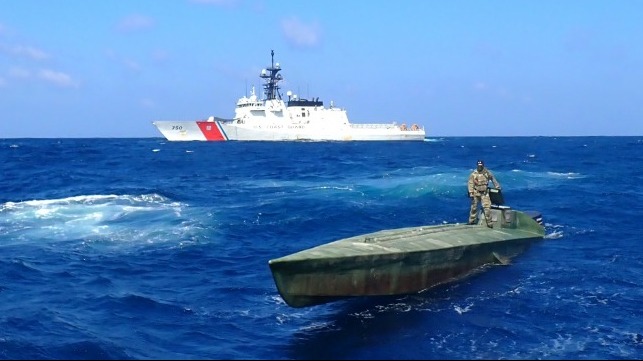How long can the US Coast Guard detain smugglers?
[ad_1]
Cutting crews often have to hold low-level smugglers on board for weeks, and that’s legal – for now
Posted on November 24, 2021 at 7:55 PM by
CIMSEC
[By Thomas “Buddy†Bardenwerper]
This article is an excerpt, and the reader is invited to consult its complete two-part form on CIMSEC here.
Prolonged Detentions and Federal Rule of Criminal Procedure 5 (a)
Once the Coast Guard succeeds in banning the drugs, the smugglers are embarked on the Coast Guard on patrol as detainees. Rarely, if ever, will these people be formally placed under arrest while at sea, meaning they will not be read about their Miranda rights or questioned.
It is only when detainees are disembarked on American soil – a few days or weeks later – that they are officially placed under arrest, usually by agents of the Drug Enforcement Administration (DEA) or Homeland Security. Investigations (HSI). Delaying the formal arrest avoids the Fed. Rule of Crime. The procedural requirement 5 (a) (1) (B) that “a person making an arrest outside the United States shall bring the accused without undue delay to a trial judge, unless a law does not provide otherwise â€.
Long detentions
These prolonged detentions have come under scrutiny in recent years. In particular, the New York Times Magazine reported how, in the space of six years, “more than 2,700 men […] were taken from boats suspected of trafficking Colombian cocaine to Central America, to be transported in the ocean for weeks or months as the American ships continue their patrols.
These decisions about where and when to transfer detainees ashore are not only left to the discretion of the Coast Guard, but are rather made by the Department of Justice and its subordinate agencies. These organizations justify the long periods of detention by pointing out the logistical obstacles associated with patrolling more than six million square kilometers of ocean and the fact that most Latin American countries do not allow the air transfer of detainees to them. United States. If the U.S. government is serious about tackling the relentless northbound flow of cocaine with only a handful of coast guards deployed at any given time, such assets cannot be taken out of combat for days just to transit a crew. contraband at the port.
The defendants have had little success in challenging the legality of their extended stays on the coast guard. In United States v. Cabezas-Montano, The Eleventh Circuit denied an Ecuadorian national’s argument that the 49-day delay between his initial detention in the eastern Pacific and his presentation to a magistrate in Florida violated both Feds. Criminal Rule. Pro. 5 (a) and the Fourth Amendment entitlement to probable cause determination.
Possibility of purchase on the forum
Some believe that the Coast Guard’s practice of transporting detained smugglers great distances – and in some cases through the Panama Canal – to the government-friendly Eleventh Circuit amounts to unacceptable forum shopping.
In Cabezas-Montano, however, the Eleventh Circuit rejected the defendant’s claim “that the government willfully delayed its presentation to a trial judge in order to make the forum shop because the federal courts in California require the government to prove a” American link to establish jurisdiction over the matter, while Florida courts do not. According to the court, even if such an incentive existed, “The MDLEA [Maritime Drug Law Enforcement Act] does not prohibit the government from taking offenders to Florida instead of California [because] a person who violates the MDLEA “can be tried in any district”, “if the offense was started or committed on the high seas”.
The government rebuffed an even stronger claim of forum shopping in Alvarez-Cuan v. United States, a Middle District of Florida case in which a smuggler challenged his conviction for MDLEA. Alvarez-Cuan argued he should have been tried in the District of Puerto Rico and the Central District of Florida because a coast guard he was embarked on was arrested in the Port of San Juan before his possible transfer ashore in Tampa.
The tribunal dismissed her motion on procedural grounds, but noted that the jurisdiction claim was unfounded since the MDLEA “clearly states […] that the accused can be tried in any district. In reaching this conclusion, the court cited precedent in United States v. Gonzales-Cahvec.
In Gonzales-Cahvec, the Eleventh Circuit ruled that the MDLEA forum provision was properly based on s. III, sect. 2 of the Constitution, which states that when a crime is “not committed in any state, the trial shall take place at the place (s) determined by Congress by law”. However, the Eleventh Circuit added that the jurisdiction over Gonzales-Cahvec was properly established in the Southern District of Florida, as it was there that he “first entered the United States.”
While seemingly reasonable, this logic does not support the Middle District of Florida’s decision in Alvarez-Cuan – the previous case – because Alvarez-Cuan “first entered the United States” in the District of Puerto Rico when the cutter passed through American territorial seas en route to the San Juan Pier. Or maybe the cases stand out because Alvarez-Cuan was not physically transferred to land? The Middle District of Florida did not say so.
Take-out detention
For the time being, the coastguard’s dual practice of prolonged detention of smugglers and selection of government-friendly locations appears resistant to judicial attack. Long detentions are likely to continue – unless they are particularly egregious – because judges know the maritime anti-drug mission would be logistically impossible if cutters were to rush detainees ashore after each ban.
A practical forum selection will likely continue to be valid because the only judges and judges who can consider such a practice illegal sit on either the Government-friendly Eleventh Circuit or the majority conservative Supreme Court. However, while the government in general and the Coast Guard in particular benefit from this status quo, both entities would do well to develop long-term contingency plans in case the judiciary ever changes course.
Conclusion
All three branches of the US government helped create a maritime law enforcement apparatus specifically designed to combat South American cocaine trafficking. The executive contributed to an aggressive and competent coast guard; the legislator produced the MDLEA; and the judiciary has provided the government with favorable interpretations of laws and the Constitution.
Even in today’s favorable legal environment, several hundred known contraband companies go untargeted each year. There are simply too few cutters and too many square kilometers of ocean. For the math to change, either Americans must curb their appetite for cocaine or their government must legalize and regulate drugs.
Until either of these changes occur, the cycle of coast guard bans, detentions and prosecutions will continue to unfold, with lawyers making the points raised in this article, traffickers low-ranking South Americans heading to US prisons and cartels profiting from the illegal trade.
Thomas “Buddy” Bardenwerper served five years as a Coast Guard officer assigned to cutters based in Maine and Puerto Rico. Thanks to the GI Bill and Yellow Ribbon program, Bardenwerper will graduate this spring jointly from Harvard Law School and Harvard Kennedy School of Government.
This excerpt is courtesy of CIMSEC and is presented here in abridged form. It can be found in its original form here.
The opinions expressed here are those of the author and not necessarily those of The Maritime Executive.
[ad_2]


Comments are closed.